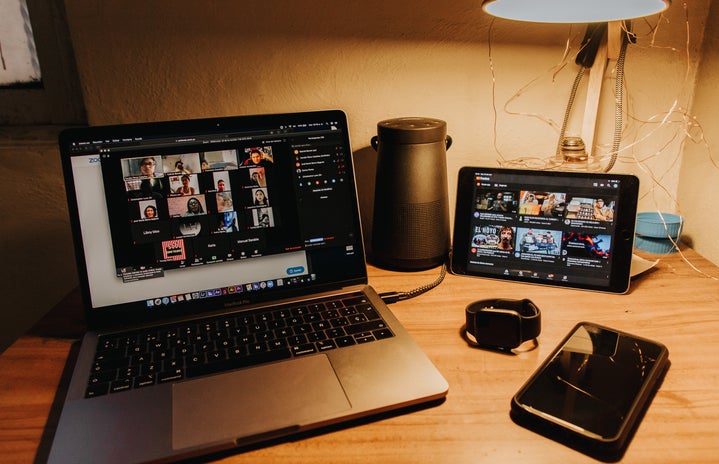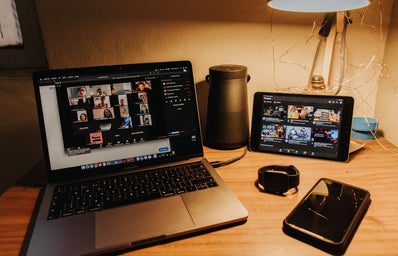We’ve been living in this pandemic for eight months now. When school, work, and everything else moved to Zoom and other online platforms, it seemed nice at first. We got to wake up two minutes before class started, we were always eating snacks, and we got to spend more time with our pets. But now, many of us are experiencing Zoom fatigue and pandemic fatigue in general. I know I am getting tired of looking at my computer screen for over twelve hours per day and I am starting to miss the person-to-person interaction. Here are some tips and tricks that could help with Zoom fatigue!
-
Turn down the blue light! We all have heard how blue light from your devices can be bad for your eyes and how it can contribute to eye problems, sleep problems, and screen fatigue. I’ve downloaded a computer extension called f.lux which helps my eyes during those long days on the computer. F.lux has settings that allow you to adjust how much blue light you want to decrease. It does not completely block out blue light but it definitely helps! There is also a night mode on your phone; I tend to leave this on the majority of the day so I’m not staring at a bright screen all day. Lastly, you can buy $10+ blue light glasses on Amazon or at your local drug store which also helps decrease blue light exposure, plus they have some cute styles!
-
Dark rooms are your friend. When my professor gives us a fifteen-minute break, I turn off my lights, lay in bed, and close my eyes. This allows me to breathe, give my eyes a break, and recoup for the second half of class. This is also a nice time to stretch with your eyes closed and just take a quick break from Zoom and other devices.
-
Change it up! If you have a laptop, try to move to another location (ex. outside) for a class or a meeting. This allows you to refocus and not feel like you’re stuck at your desk all day long. If you’re lucky enough to have a standing desk, makeshift standing desk, or a counter that’s the perfect height, that might be a good place to try Zooming into class as well!
-
Do eye exercises. It might sound silly, but your eyes have muscles and they need to be cared for just like the rest of your body. We are already working our eyes so hard every day. I do daily eye exercises and eye care in order to help me when I’m staring at screens all day. One exercise I do is the 20-20-20; every twenty minutes or so, I stare at something twenty feet away for twenty seconds. This allows your eyes to readjust and then refocus. Another exercise I do is I roll my eyes to the back of my head (don’t do this while the teacher is talking though), look down, and to the sides (without moving my head) while keeping my eyes closed. This feels great and also allows me to refocus my eyes! Lastly, every night, I also put eye drops in since my eyes are so dry from being on the computer all day. Oh, and don’t forget to blink, sometimes we forget when we’re on Zoom all day!
-
Call me! If you have participated in so many Zoom calls in one day and you are just Zoomed out, ask the next group of people if you can do a call. Many people understand the Zoom fatigue and hopefully will allow this to happen, especially after a long week. If they don’t want to participate in a call, you can ask to dial into the Zoom meeting on your phone, allowing you to hear everyone and speak when needed. This allows you to move around and it changes up the normal situation. Or maybe if the meeting points can be said over email… then try that option!
-
No selfies! I personally get so tired of looking at myself on Zoom. I’m always asking myself if it looks like I’m paying attention, or if I look presentable or where do I look so the teacher knows I’m paying attention? Easy fix. Disable the self-view on Zoom so you are only seeing the speaker and your colleagues. This allows you to relax and not have to make sure you look okay every second. Online, we feel the need to show more emotion and attention than person-to-person interactions since we’re on camera and want to portray that to our peers. This action takes that fear away and allows you to focus on the content of the meeting.
-
You can’t do everything at once. We’re all guilty of checking our email or text messages behind our Zoom tab. But try not to multi-task because this creates unnecessary stress since you have to make sure you’re still paying attention to the speaker while you’re also tending to another task that you want to give attention to. Just relax, listen to the speakers, and take notes if necessary (better to take handwritten notes).
-
Keep it interesting for your peers and yourself. I like to change my zoom virtual background every week. This is always a conversation starter on Zoom, plus it hides my messy room in the background! Some of my favorite backgrounds include The Office, Monsters Inc., and beach backgrounds! If you search Google for Zoom backgrounds, there are plenty to chose from and you can change them as often as you want!
-
Sorry, I’m busy. Since we’re all at home, we have fewer excuses to be “busy.” Therefore, we might be able to make that meeting time, but do we want to? Isn’t that usually the time where you lay on the couch and watch TikTok? Or the time where you go to the beach? Make sure to block out times that you absolutely can’t Zoom, these times are blocked out every week for self-care activities or whatever else you like to do. For example, I tell my groups that I am unavailable to meet on the weekends unless of course, it’s a HUGE emergency. This gives me time to get away and not be bothered by my computer.
We must understand that this pandemic needs to be taken seriously and we are limiting person-to-person interactions to keep us safe, but there are things we can do to stay healthy mentally and physically. Don’t forget to take a break, unlock your jaw, relax your shoulders, call your friends and family, and take a deep breath. We will get through this together and I hope at least a few of these tips will help you combat Zoom fatigue in the coming months!


